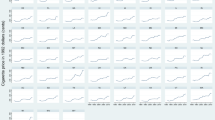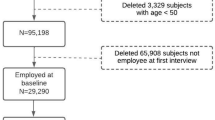Abstract
We use data from the Health and Retirement Study to examine the relationship between retirement and smoking decisions. Retirement might affect smoking behavior through a change in the opportunity cost of time, job-related factors or income. To estimate the causal effect of retirement on smoking habits, we exploit eligibility for Social Security benefits at age 62 to account for the endogeneity of retirement. We find suggestive evidence that retirement increases the probability of smoking among ever smokers, but this effect is sensitive to the econometric specification used. We also find evidence of heterogeneity in the impact of retirement.

Similar content being viewed by others
References
Ayyagari, P., and J.L. Sindelar . 2010. The Impact of Job Stress on Smoking and Quitting: Evidence from the HRS. The BE Journal of Economic Analysis & Policy, 10 (1).
Bazzoli, G.J. 1985. The Early Retirement Decision: New Empirical Evidence on the Influence of Health. The Journal of Human Resources, 20 (2): 214–234.
Bhattacharya, J., D. Goldman, and D. McCaffrey . 2006. Estimating Probit Models with Self-Selected Treatments. Statistics in Medicine, 25 (3): 389–413.
Bound, J., and T. Waidmann . 2007. Estimating the Health Effects of Retirement. Working paper no. 2007-168, Ann Arbor, MI: University of Michigan Retirement Research Center.
Card, D., C. Dobkin C, and N. Maestas . 2004. The Impact of Nearly Universal Insurance Coverage on Health Care Utilization: Evidence from Medicare. NBER Working Paper No. 10365.
CDC. 2008. Smoking-Attributable Mortality, Years of Potential Life Lost, and Productivity Losses — United States, 2000–2004. Mortality and Morbidity Weekly Report 57(45): 1226–1228.
Charles, K. 2002. Is Retirement Depressing? Labor Force Inactivity and Psychological Well-Being in Later life. NBER Working Paper No. 9033.
Coe, N., and M. Lindeboom . 2008. Does retirement kill you? Evidence from early retirement windows. IZA Discussion Paper 3817, Institute for the Study of Labor (IZA).
Coe, N., and G. Zamarro . 2011. Retirement Effects on Health in Europe. Journal of Health Economics, 30 (1): 77–86.
Cutler, D., and E. Glaeser . 2007. Social Interactions and Smoking. Harvard Institute of Economic Research Discussion Paper No. 2153.
Dave, D., and R. Kaestner . 2009. Health Insurance and Ex Ante Moral Hazard: Evidence from Medicare. International Journal of Health Care Finance and Economics, 9 (4): 367–390.
Deb, P., W. Gallo, P. Ayyagari, J. Fletcher, and J. Sindelar . 2011. The Effect of Job Loss on Overweight and Drinking. Journal of Health Economics, 30 (2): 317–327.
Evans, W.N., M.C. Farrelly, and E. Montgomery . 1999. Do Workplace Smoking Bans Reduce Smoking? American Economic Review, 89 (4): 728–747.
Everett, S., C. Husten, L. Kann, C. Warren, D. Sharp, and L. Crosset . 1999a. Smoking Initiation and Smoking Patterns Among US College Students. Journal of American College Health, 48 (2): 55–60.
Everett, S., C. Warren, D. Sharp, L. Kann, C. Husten, and L. Crossett . 1999b. Initiation of Cigarette Smoking and Subsequent Smoking Behavior Among U.S. High School Students. Preventive Medicine, 29 (5): 327–333.
Falba, T. 2005. Effects of Health Events on the Smoking Cessation of Middle Aged Americans. Journal of Behavioral Medicine, 28 (1): 21–33.
Falba, T., H. Teng, J. Sindelar, and W. Gallo . 2005. The Effect of Involuntary Job Loss on Smoking Intensity and Relapse. Addiction, 100 (9): 1330–1339.
Fletcher, J. 2010. Social Interactions and Smoking: Evidence using Multiple Student Cohorts, Instrumental Variables, and School Fixed Effects. Health Economics, 19 (4): 466–484.
Goldman, D., D. Lakdawalla, and Y. Zheng . 2008. Retirement and Weight. Working Paper, RAND corporation.
Grossman, M. 1972. On the Concept of Health Capital and the Demand for Health. Journal of Political Economy, 80 (2): 223–255.
Gruber, J., and B. Köszegi . 2001. Is Addiction ‘Rational’? Theory and Evidence. The Quarterly Journal of Economics, 116 (4): 1261–1303.
Gruber Jonathan, H., and S. Mullainathan . 2005. Do Cigarette Taxes Make Smokers Happier. The BE Journal of Economic Analysis & Policy, 5 (1): 1–45.
Haider, S., and M. Stephens . 2007. Is There a Retirement-Consumption Puzzle? Evidence using Subjective Retirement Expectations. The Review of Economics and Statistics, 89 (2): 247–264.
Hurd, M., J. Smith, and J. Zissimopoulos . 2004. The Effects of Subjective Survival on Retirement and Social Security Claiming. Journal of Applied Econometrics, 19 (6): 761–775.
Imbens, G., and J. Angrist . 1994. Identification and Estimation of Local Average Treatment Effects. Econometrica, 62 (2): 467–475.
Juster, F., and R. Suzman . 1995. An Overview of the Health and Retirement Study. The Journal of Human Resources, 30 (4): S7–S56.
Kan, K. 2007. Cigarette Smoking and Self-Control. Journal of Health Economics, 26 (1): 61–81.
Khwaja, A., F. Sloan, and S. Chung . 2006. Learning about Individual Risk and the Decision to Smoke. International Journal of Industrial Organization, 24 (4): 683–699.
Laibson, D. 1997. Golden Eggs and Hyperbolic Discounting. The Quarterly Journal of Economics, 443–477.
Manning, W., E.B. Keeler, J.P. Newhouse, E.M. Sloss, and J. Wasserman . 1989. The Taxes of Sin: Do Smokers and Drinkers Pay their Way? JAMA: The Journal of the American Medical Association, 261 (11): 1604–1609.
McGarry, K. 2004. Health and Retirement. Do Changes in Health Affect Retirement Expectations? Journal of Human Resources, 39 (3): 624–648.
McGeary, K.A. 2009. How do Health Shocks Influence Retirement Decisions? Review of Economics of the Household, 7 (3): 307–321.
Newhouse, J. 1993. Free for All? Lessons from the RAND Health Insurance Experiment, A RAND Study. Cambridge, London: Harvard University Press.
O’Donoghue, T., and M. Rabin . 1999. Doing it Now or Later. The American Economic Review, 89 (1): 103–124.
Rohwedder, S., and R. Willis . 2010. Mental Retirement. Journal of Economic Perspectives, 24 (1): 119–138.
Rust, J., and C. Phelan . 1997. How Social Security and Medicare Affect Retirement in a World of Incomplete Markets. Econometrica, 65 (4): 781–831.
Taylor, D.H., V. Hasselblad, S.J. Henley, M.J. Thun, and F.A. Sloan . 2002. Benefits of Smoking Cessation for Longevity. American Journal of Public Health, 92 (6): 990–996.
Acknowledgements
This work was supported in part by Grant Number R01AG027045 from the National Institute on Aging to Yale University. I am grateful to W. David Bradford, Jason Fletcher, Delia Furtado, Maarten Lindeboom, Martin Salm, and Jody Sindelar for helpful comments and suggestions. I am also grateful to seminar participants at Yale University, University of Memphis, University of Iowa, Tilburg University and participants at the American Society of Health Economists, Southern Economic Association, and Eastern Economic Association conferences for their feedback.
Author information
Authors and Affiliations
Rights and permissions
About this article
Cite this article
Ayyagari, P. The Impact of Retirement on Smoking Behavior. Eastern Econ J 42, 270–287 (2016). https://doi.org/10.1057/eej.2014.51
Published:
Issue Date:
DOI: https://doi.org/10.1057/eej.2014.51




